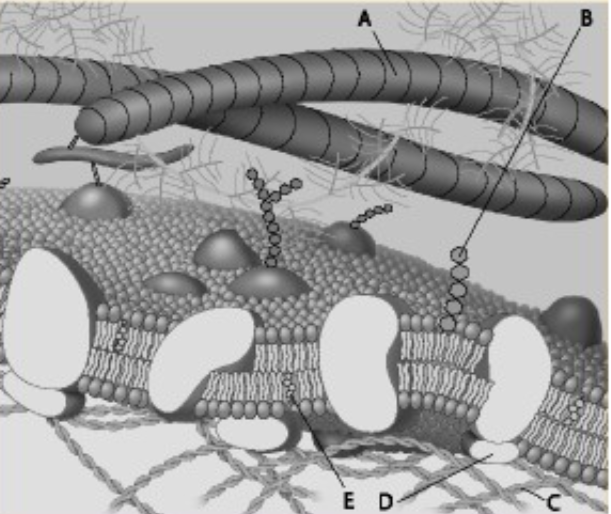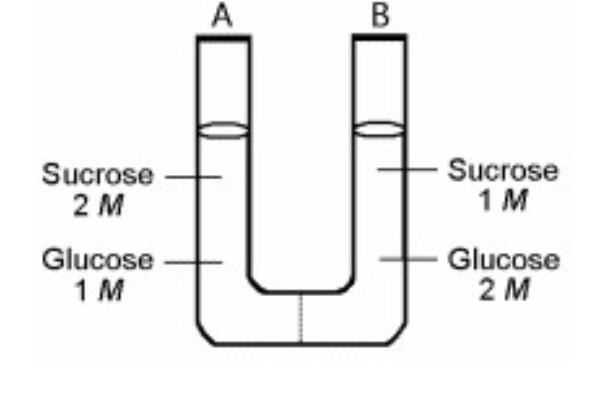AP Bio Unit 4 Cell Biology
1/26
Earn XP
Description and Tags
Mastering Biology Questions
Name | Mastery | Learn | Test | Matching | Spaced |
|---|
No study sessions yet.
27 Terms
A newspaper ad for a local toy store indicates that an inexpensive toy microscope available for a small child is able to magnify specimens nearly as much as the more costly microscope available in your college lab. What is the primary reason for the price difference?
The toy microscope usually uses a different wavelength of light source.
The toy microscope does not have the same fine control for focus of the specimen.
The toy microscope magnifies a good deal, but has low resolution and therefore poor quality images.
The college microscope produces greater contrast in the specimens.
The toy microscope magnifies a good deal, but has low resolution and therefore poor quality images.
Cell size is limited by ____.
the number of proteins within the plasma membrane
surface to volume ratios
the size of the endomembrane system
the surface area of mitochondria in the cytoplasm
surface to volume ratios
Prokaryotes are classified as belonging to two different domains. What are the domains?
Bacteria and Protista
Archaea and Protista
Bacteria and Archaea
Bacteria and Eukarya
Bacteria and Archaea
Which structure is common to plant and animal cells?
central vacuole
mitochondrion
centriole
chloroplast
mitochondrion
Which of the following macromolecules leaves the nucleus of a eukaryotic cell through pores in the nuclear membrane?
phospholipids
DNA
amino acids
mRNA
mRNA
A cell with an extensive area of smooth endoplasmic reticulum is specialized to _____.
synthesize large quantities of lipids
play a role in storage
actively export protein molecules
import and export protein molecules
synthesize large quantities of lipids
The Golgi apparatus has a polarity, or sidedness, to its structure and function. Which of the following statements correctly describes this polarity?
Proteins in the membrane of the Golgi may be sorted and modified as they move from one side of the Golgi to the other.
Lipids in the membrane of the Golgi may be sorted and modified as they move from one side of the Golgi to the other.
Transport vesicles fuse with one side of the Golgi and leave from the opposite side.
All of the listed responses correctly describe polarity characteristics of the Golgi function.
All of the listed responses correctly describe polarity characteristics of the Golgi function.
Which of the following is NOT true? Both chloroplasts and mitochondria _____.
are part of the endomembrane system
have their own DNA
have multiple membranes
are capable of reproducing themselves
are part of the endomembrane system
In a plant cell, DNA may be found _____.
only in the nucleus and chloroplasts
in the nucleus, mitochondria, chloroplasts, and peroxisomes
only in the nucleus
in the nucleus, mitochondria, and chloroplasts
in the nucleus, mitochondria, and chloroplasts
Motor proteins provide for molecular motion in cells by interacting with what types of cellular structures?
components of the cytoskeleton
membrane proteins of the inner nuclear envelope
cellulose fibers in the cell wall
free ribosomes and ribosomes attached to the ER
components of the cytoskeleton
Plasmodesmata in plant cells are most similar in function to which of the following structures in animal cells?
extracellular matrix
gap junctions
desmosomes
tight junctions
gap junctions

Which component is cholesterol?
B
C
D
E
E
Which of the following is a characteristic feature of a carrier protein in a plasma membrane?
It has no hydrophobic regions.
It works against diffusion.
It exhibits a specificity for a particular type of molecule.
It requires the expenditure of cellular energy to function.
It exhibits a specificity for a particular type of molecule.

The solutions in the two arms of this U-tube are separated by a membrane that is permeable to water and glucose but not to sucrose. Side A is half-filled with a solution of 2 M sucrose and 1 M glucose. Side B is half-filled with 1 M sucrose and 2 M glucose. Initially, the liquid levels on both sides are equal.
Refer to the figure. Initially, in terms of tonicity, the solution in side A with respect to the solution in side B is ___.
hypotonic
saturated
isotonic
hypertonic
isotonic
The sodium-potassium pump is called an electrogenic pump because it _____.
contributes to the membrane potential
is used to drive the transport of other molecules against a concentration gradient
ionizes sodium and potassium atoms
pumps equal quantities of Na+ and K+ across the membrane
contributes to the membrane potential
The voltage across a membrane is called the _____.
chemical gradient
osmotic potential
membrane potential
electrochemical gradient
membrane potential
Ions diffuse across membranes through specific ion channels down _____.
their electrochemical gradients
their chemical gradients
the electrical gradients
their concentration gradients
their electrochemical gradients
The phosphate transport system in bacteria imports phosphate into the cell even when the concentration of phosphate outside the cell is much lower than the cytoplasmic phosphate concentration. Phosphate import depends on a pH gradient across the membrane (more acidic outside the cell than inside the cell). Phosphate transport is an example of _____.
cotransport
passive diffusion
facilitated diffusion
active transport
cotransport
White blood cells engulf bacteria using _____.
osmosis
phagocytosis
receptor-mediated exocytosis
pinocytosis
phagocytosis
The diameter of a typical eukaryotic cell is approximately ten times the diameter of a typical prokaryote. What is the ratio of the volume of typical eukaryotic:prokaryotic cells?
1000:1
100:1
10:1
1000:1
Identify the correct statement about differences between rough and smooth endoplasmic reticulum (ER).
Rough ER consists of a network of membranous tubules and sacs called cisternae, whereas smooth ER is less complex.
The outer surface of smooth ER lacks ribosomes, whereas the outer surface of rough ER has ribosomes.
Smooth ER is part of the endomembrane system of the eukaryotic cell, and rough ER is not.
The outer surface of smooth ER lacks ribosomes, whereas the outer surface of rough ER has ribosomes.
Select the correct statement describing cellular structure or function.
Plant and animal cells both carry out cellular respiration, producing ATP.
Only plant cells contain chloroplasts, and only animal cells contain mitochondria.
Mitochondria and chloroplasts are part of the endomembrane system of the eukaryotic cell.
Plant and animal cells both carry out cellular respiration, producing ATP.
What happens when two solutions separated by a selectively permeable membrane reach osmotic equilibrium?
Water molecules no longer move between the solutions.
Water molecules move between the two solutions, but there is no net movement of water across the membrane.
Water molecules continue to move from the hypotonic solution to the hypertonic solution.
Water molecules move between the two solutions, but there is no net movement of water across the membrane.
Select the correct statement about osmosis.
Osmotic equilibrium cannot be reached unless solute concentrations equalize across the membrane.
Osmosis is the diffusion of water molecules across a selectively permeable membrane.
If a dead cell is placed in a solution hypotonic to the cell contents, osmosis will not occur.
Osmosis is the diffusion of water molecules across a selectively permeable membrane.
Which factors affect the rate of osmotic movement of water?
No factors have an effect; the rate of osmosis is constant.
Hydrostatic pressure applied to a hypertonic solution separated from a hypotonic solution by a selectively permeable membrane increases osmotic movement across the membrane.
The rate of osmosis increases with increasing differences in solute concentrations between two solutions separated by a selectively permeable membrane.
The rate of osmosis increases with increasing differences in solute concentrations between two solutions separated by a selectively permeable membrane.
Which statement is correct?
The contents of a red blood cell are hyperosmotic to distilled water.
A solution of distilled water is hypotonic.
A solution of seawater is hypertonic.
The contents of a red blood cell are hyperosmotic to distilled water.
Which of the following molecular movements is due to diffusion or osmosis?
The sodium-potassium pump pumps three sodium ions out of a neuron for every two potassium ions it pumps in.
Cells of the pancreas secrete insulin into the bloodstream.
When a plant cell is placed in concentrated salt water, water moves out of the cell.
When a plant cell is placed in concentrated salt water, water moves out of the cell.